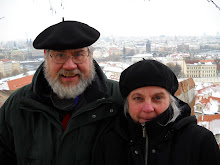
Lindsay and our friend Miro at the cafe in Prague.
I said at the start of this adventure that I want to learn at least as much as I teach. We’re almost at the end of the work, so I thought I’d take a first cut at what I’ve learned.
Here’s what I said at the start:
“Thinking about what I want to learn from this trip, as well as what I want to teach. To learn, I think, what the essence, the unchangeable center is - this is what separates organizing from all the other stuff you could do. To further explore the edges of that, the frontiers, where the work is different - and it's always different - but the essence is in place.”
So here’s what I’ve learned:
First, about myself. I like to train. I really like to do training. There’s the thrill of danger – will it work? Can I make sense to this new group of people? Will it make any difference? And then, if you’re lucky, the “click” when folks get it – when it does work. It’s intense, and three two-day workshops in a strange language, each with a different collection of folks in radically different settings – it’s an Extreme Sport. But I liked it.
Next, about the work. Every place has good people, trying their best to make it better in spite of the odds. I learn this everywhere I go, in the States, in Canada, in Australia. It’s still an exhilarating lesson.
Clearly, organizing “the US way” will never work here – but the core truths, the important principles, the essentials are powerful, important and apply here. For example, The “Ten Rules” from my little green book, which include brilliant obviosities (not a word, I know) like “Nobody will come out unless they know about the meeting”, really connected for people. They had their own ways, maybe not phone lists or printed flyers, but intentional and accountable and intense outreach is a step that nobody can skip, and it’s easily translated into the local ways.
Words matter – not just the literal translation, but understanding the context and the meaning of the literal translation. It takes listening and time but it’s essential. You have to know the difference between a disagreement over the core principles and the wrong word. Hard lesson: I said to somebody at dinner in rural Poland, meaning the most positive of compliments – “You’ve been a wonderful collaborator.” Everybody’s face fell, and I remembered that collaborators were those who helped the Nazis against their own people. They graciously explained, but I knew I had stepped in the smelly stuff.
The most critical of these “word” issues was my favorite little mnemonic – “Organizers Organize Organizations”. I stole this long ago from Heather Booth of the Midwest Academy (I think), and it captures the key question for me – what are you building? I was delighted to discover that in both Slovak and Polish the acronym is the same – OOO. But at each of the three sessions in Poland I was met with concerns, objections, misunderstandings and disagreements – including from folks who seemed to “get” most of the other points about organizing. In the end, I found that the implications of the word for “organization” were very clearly those of an agency, a corporation, a formal legal structure. What I seemed to be saying was “organizers build corporations”. Much better would be something like “community organizers build community groups”. I’ll be talking with the translators for help in the re-write.
There’s a difference between backing down on core concepts and adapting to the context. Another example – Slawek, the translator in Szczecin, explained that after the end of communism, the vultures and scam artists descended on Poland, and one was Amway – lots of people believed the hype, went door-to-door pestering their neighbors and friends and lost lots and lots of money on product they bought but couldn’t sell. So calling what we do to reach out “door-to-door” conjures up those horrible associations. The poetic sounding “oko w oko” (said “ohkoh vohcoh”) works better – it means “eye to eye”.
Finally, money matters. Like everywhere, good people who speak out on one issue and win, learn and want to keep going and building power – eventually they figure out that you have more power if you hire somebody to specialize as the organizer. Where the resources to do that are scarce – whether in Poland or Slovakia or Alabama – you end up with a bit of government money and a church grant and a bit of dues – and the source of the money can distort the work. The philanthropic sector here – in all the countries I’ve seen – is very limited, and the legal and tax context works against effective local grassroots fundraising. It’s not impossible, but it’s tough. Just as Needmor works to expand money for organizing in the US, I think there’s a real need to systematically take on the obstacles to funding power oriented grassroots work all over Europe. In my most convoluted challenge to the Polish translators, I said in Szczecin, “Think about taking collective action to increase the money available to support taking collective action.” (It needs translating into English, too I think.)
And of course, the pig is the holiest and best creature given to the Universe, and in every form it is wonderful. Poland is the peak of the pig’s many homes.











Great to read through your unfolding story from first to last.
ReplyDeleteWe will be very glad to get the full version when you return.
Safe travels to you -- we still have you in our prayers.
Hugh (& Kyle)
Ah, and so it became: Dave, the Anthropologist.
ReplyDeleteGodspeed, Dave and Lindsay. Can't wait to hear more...
Abrazos,
Roberta